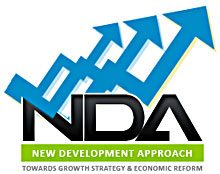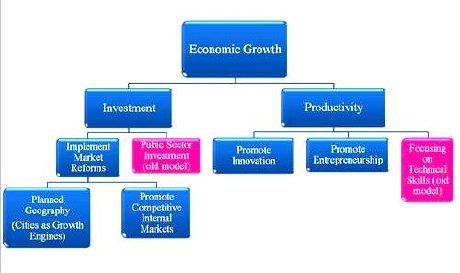Adil Najam
 (Editor’s Note: This is the first in a series on Pakistan’s New Growth Startegy. The Planning Commission of Pakistan has invited ideas and suggestions on this and we invite and encourage our readers to please help in highlighting the best and most innovative ideas they can think of. Have your say.)
(Editor’s Note: This is the first in a series on Pakistan’s New Growth Startegy. The Planning Commission of Pakistan has invited ideas and suggestions on this and we invite and encourage our readers to please help in highlighting the best and most innovative ideas they can think of. Have your say.)
I have been planning to write this post for most of a month. I have kept postponing because more sensational and urgent “news” kept coming in the way and I did not want our readers’ attention so diverted on the immediate that they ignored the important. All of this to say two things: First, I believe that the topic of this post is truly and deeply important and I really do hope that our readers will think very deeply about this and give us their very best feedback and ideas on this. Second, I was wrong in my original assessment and should really not have waited – the sensational and the urgent are forever with us (especially in Pakistan) and should never distract us from the important. And, ‘important’ is what this post is about!
The Planning Commission of Pakistan – now headed by Dr. Nadeem ul Haque, an out-spoken economist; international economic policy expert; former head of the Pakistan Institute of Development Economists (PIDE); and a friend and erstwhile contributor to ATP – has embarked on a fresh and bold initiative to develop a new growth policy for Pakistan – a ‘New Development Approach.’ At a time when many of us (I certainly stand accused) are caught up in the politics of the moment and immediate concerns, here is a strong, timely and very welcome initiative to think long-term – beyond the dynamics of today’s politics or this government or that – about exactly what will get our economic house in order on a sustainable and long-term basis. What do we need to do today, that will make improve economic and developmental conditions tomorrow?
With a refreshing and energetic zeal, Dr. Nadeem ul Haque has been reaching out to all elements of the Pakistani intelligentsia – universities, business sector, independent experts, citizens, the public -to think about this question and to give the Planning Commission their inputs, their ideas, their critique, their suggestions. Dr. Haque has also reached out personally to us here at All Things Pakistan to contribute to this national dialogue and discussion on exactly what is needed in a national growth strategy for Pakistan, and a new development approach for our future. I have every reason to believe that this is not an empty gesture, but an honest and real desire on his part to get a serious dialogue going on the best ideas for a growth strategy for Pakistan. I would urge our readers to seriously avail of this opportunity and to share their ideas and suggestions on this issue. Not every idea, of course, can or should be implemented, but I have high confidence that in this case your ideas will be read heard, digested and have a real chance of influencing the final shape of the national growth strategy. For those of us who have long cribbed that no one listens to us, here is a real invitation to be heard. Let us not disappoint!

In December, while in Pakistan, I had the opportunity to participate and speak at an event organized on the new growth strategy at the Higher Education Commission (HEC) which included some of Pakistan’s leading economic scholars as well as university leaders from across Pakistan. A lot of the confidence you sense in the paragraphs above comes from that experience. It was heartening to see our economic policy makers making a serious and heartfelt effort at inviting debate and ideas. It was more heartening to see universities being viewed and treated with the respect than knowledge producers deserve in all societies. It was even more heartening to see a real discourse and a thirst for ideas and a discussion that did start looking at the long-term questions of national development in the serious intellectual and ideational perspectives. What I think was most heartening was the clear sense in that room that ideas matter. In many ways, that is what any strategy is about – a discourse on ideas and an attempt to hit at the right idea about what should happen.
A rather long introduction, I realize, to introduce this series of posts. At this point, I thought starting with the general idea of a ‘growth strategy’ is what would work best. We will have more specific posts later, but at this point, when you think of growth for Pakistan, what are the type of things that come to your mind? Remember, this is not making a wish list or throwing out cynical jugats. What are the most strategic investments in policy, in idea and in resources that can be made today that will put Pakistan on a path to growth.
That Pakistan is in an economic mess is not in question. It is also clear that a central part of any solution – maybe even the first step – has to be to curtail the inefficiencies and wastes in the system – in terms of corruption at all levels and in terms of waste and excess. However, while that is necessary, it will not be sufficient. Simply given the demographic realities of Pakistan, a real growth impetus will be necessary. If the corruption and waste continues, this growth will be further stymied. But, even if the corruption and waste was checked real and sustained growth will be needed. Where do you think it can come from? And how? That, in essence, is the strategic question.
The new development approach that Dr. Nadeem-ul-Haque and the Planning Commission have begun the discussion with is built on four pillars:
- Increase productivity – Through Innovation
- Create Competitive Conditions – Through Internal Markets
- Urban Management – Through Creative Cities
- Youth Engagement – Through Mobilizing the Energies of the Young
There is, of course, much more beneath each of these ‘motors’ of growth – productivity, competitiveness, urban management and youth engagement. More importantly, what are the mechanisms in policy of unleashing the potential in these areas? And what other areas might one think of (knowing that long laundry lists of litany are not what strategy is made of!).
We will share more of what the Planning Commission and others are thinking of on these. But, first, we thought we should ask you what you think!



















































Need for the hour:
1. Get a debt moratorium from all foreign debt agencies
2. Pay them off with loans from friendly countries who doesn’t interfere in our sovereignty i.e. China, KSA, Malaysia, Brunei, UAE
3. Reduce consumer goods imports and sacrifice our needs to save foreign reserves
4. Move the money from debt servicing to education, health and infrastructure development
5. Stop drone attacks/extra judicial killings and war in tribal area
6. Apologies and compensate all victims of wars
7. Reduce government spending on ministries
8. Replace current IMF/World Bank finance minister with a Pakistani mercantilist economist as a Finance Minister
9. Subsidize wheat, sugar, gas, electricity and basic vegetables and lentils
10. Speed up judicial proceedings so verdict comes out in less than 90 days of filing case
11. Use Reko Diq and Thar coal for national usage
12. Country leader should prepare Pakistanis for meeting these objectives using weekly speech by PM and local Imams in Friday sermons.
For growth of Pakistan, I encourage our youth to get projects and outsourced business for search engine optimization from Elance, vWorker, and other platforms. That is a major foriegn exchange source and I am personally willing to guide anyone in this regard. I can be reached at 0345 5177323
Adil, this is the most constructive message that I have read in any Pakistani website. Growth of new cities is an excellent strategy. At the heart of this program there should be another strategy to make rural areas self sufficient. We are an agricultural country and loosing these skills due to rural manpower drain to cities and to a culture of handouts. Industrial and agricultural development must go hand in hand
Take advantage of being a “nuclear power”, split the army into two, with 200,000 assigned entirely to internal security. We face criminals, mad mullahs and terrorists who destroy our country from inside every day.
Hopeless situation! Our people are too wrapped up in love with religion, God, His prophet. We do not have time to be materialistic, be progressive, be competitive and rather leave it up for Allah to decide. I have seen smart minds who went to excellent universities, earned their masters only to go back and sit in their fathers’ shops….so sad!